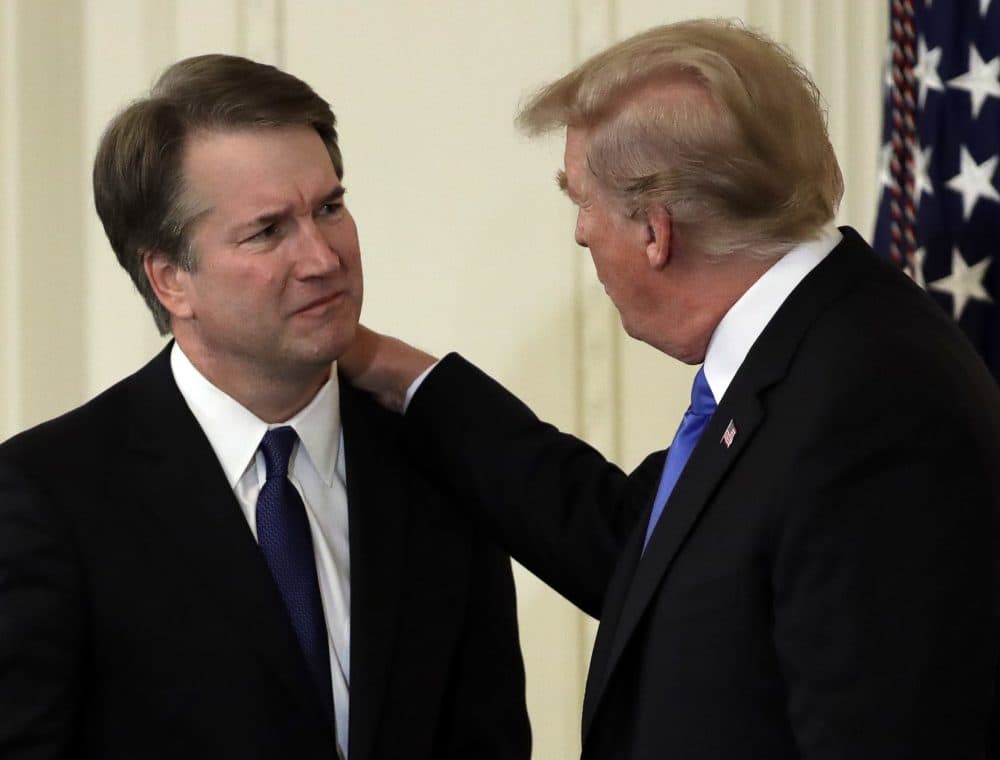Advertisement
Commentary
Trump’s SCOTUS Nominee Can’t Kill Roe V. Wade. It’s Already Dead

Brett Kavanaugh, Donald Trump’s Supreme Court nominee, worries some conservatives as perhaps too watery in his anti-abortion views. But as Kavanaugh, a U.S. appellate judge in Washington, D.C., was vetted by anti-abortion advisers, both sides believe, assuming the Senate confirms him, that the court may be tuning up for Roe v. Wade’s dirge.
One pro-choice historian predicted a rerun of the underground disregard for state abortion bans before Roe was decided in 1973. Anti-choicers meanwhile are slipping in their own drool over the prospect that what they consider the main beam supporting America’s moral rot will be knocked over once and for all.
Take a breath, everybody. You’ve lost sight of a simple fact: We’ve been living in a post-Roe world for years. To tweak an old joke, Roe v. Wade today describes two ways to cross a river, not the law governing abortion.
Sure, the SCOTUS decision allowing pregnancy termination before fetal viability remains on the books. But anti-abortion states, empowered by another ruling from the high court, have made abortion access difficult if not impossible, such that Boston University law professor Tracey Maclin told me, “Neither practically speaking nor as a matter of legal doctrine is [Roe] the law of the land.”
If the court formally overturns Roe (some analysts deem that unlikely), it will be up to states to decide their own abortion policies. But they’ve long been doing that anyway, thanks to a 1992 decision, Planned Parenthood of Southeastern Pennsylvania v. Casey. In Casey, the justices held that state abortion restrictions were constitutional if they did not place “substantial obstacles” in the way of women’s access to abortion.
Take a breath, everybody. You’ve lost sight of a simple fact: We’ve been living in a post-Roe world for years.
This “undue burden” standard, Maclin said, is “notoriously vague and elastic.” Unlike Roe, Casey “never describes abortion as a ‘fundamental’ right. Instead, it characterizes abortion as a ‘liberty’ interest, which means that abortion does not occupy the same high status accorded to other constitutional rights that are deemed fundamental by the Court.” While Casey prohibited states from outlawing abortion before viability, that was a small pro-choice nod, as only one or two states contemplated such outright bans, Maclin said.
Bottom line? “Roe was effectively overruled by Casey.”
Vox seconds this view, reporting that “in many regions across the country, the end of Roe is essentially already here,”
A half dozen states have just one abortion clinic. One, Mississippi, allows abortions up to just 15 weeks of pregnancy; 21 states permit it only up to 20 weeks. (That latter limit chagrins pro-choice Americans, but it’s the standard in most nations, including progressive ones).
Various states have legislated other speed bumps, from mandatory waiting periods and pre-abortion counseling to curbs on insurance coverage.
If pro-lifers already have planted their flag in friendly states, an official Roe reversal, while thrilling purists, won’t persuade Massachusetts, New York, Vermont and other pro-choice jurisdictions to stand down in guaranteeing access. Conversely, should the court reverse, we can expect pro-choice rallies, fundraising appeals, and speeches by NARAL leaders, but do they really think they’ll change anti-choice governors’ and legislators’ minds?
Indeed, states already are preparing for a world where Roe v. Wade is formally interred. Seventeen have statutes that could ban abortion if Roe goes, putting de jure icing on their de facto cakes of little or no abortion access. Meanwhile, “Some states are moving in the opposite direction by passing laws that essentially codify the parameters of Roe,” according to the pro-choice Guttmacher Institute.
There are other reasons not to hyperventilate over the high court’s abortion agenda. Just as the legal landscape has changed since Roe, so too has reproductive medicine. Anyone worried that a Trump-molded court will return us to widespread back-alley abortions should read, first, that aforementioned historian, who debunks such horrors as mostly myth even before Roe, and second, the New York Times report about the unlikelihood of coat-hanger abortions today, given better, safer contraception and post-conception pregnancy termination.
Yet Republicans, most of them pro-lifers, idiotically gun for Planned Parenthood, which provides contraception, and Obamacare, which expanded poor women’s access to family planning. Kavanaugh’s view on the Affordable Care Act’s constitutionality is far more important to the republic than his views about the long-eviscerated Roe.
Admittedly, I say that as someone opposed to most abortions. But if pro-choice activists don't believe that the justices made roadkill of Roe long ago, well, they’ve overestimated the power of the nine robed ones before. They assumed Roe v. Wade, handed down before anything approaching a public consensus on the issue had been reached, settled the matter once and for all. We know how that worked out.
Is it any wonder that thinking pro-choicers, like Ruth Bader Ginsburg, believe Roe harmed their cause?
